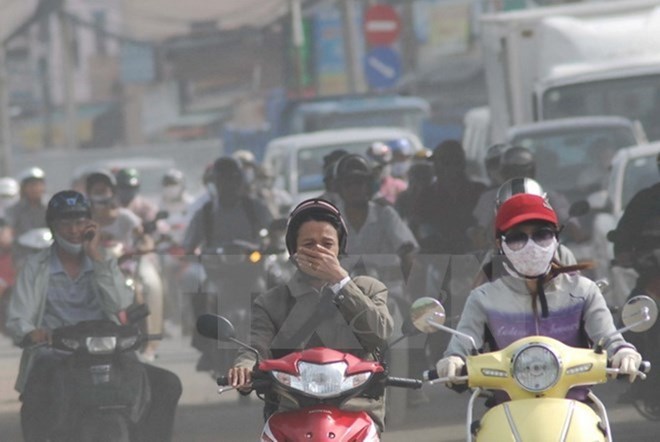[ad_1]
Smog that has appeared frequently in Ho Chi Minh City, with the most recent recorded on January 3 morning, shows that local air pollution is now at an alarming level, an expert has said.

Frequent smog in HCM City shows that local air pollution is now at an alarming level
The warning was made by Ho Quoc Bang, head of the air pollution and climate change division at the Institute for Environment and Natural Resources under the Vietnam National University – HCM City, at a discussion on January 3.
He said traffic, construction and industrial activities are the main causes of air pollution in cities. Traffic activities discharge nearly 85 percent of the total carbon monoxide emissions and many other hazardous substances. Air pollution at construction sites is five or six times higher than the standard. These activities also produce noise that worsens air pollution.
The Centre of Hands-on Actions and Networking for Growth and Environment (CHANGE) said its analyses show that HCM City is the biggest polluter in the southern region as it is home to a big number of traffic vehicles, industrial parks and construction activities. Air pollution in the city always peaks in the morning, which is also the rush hour.
According to HCM City’s environmental protection sub-department, local air pollution is mainly caused by floating dust and noise from traffic activities. Up to 72 percent of the dust data and 97 percent of the noise statistics collected at 12 locations exceeded Vietnam’s standards.
Ho Quoc Bang said air pollution ranks fourth among the causes of premature death in the world. In Vietnam, air pollution makes about 1.5 million people suffer from chronic obstructive lung disease every year. Notably, in big and populous cities like HCM City, air pollution is currently an alarming problem for health.
Suggesting solutions to local air pollution, he said the city should control motorbike exhaust emissions, replace old buses with those using cleaner fuel, impose emissions cap on factories, and zone areas where construction and industrial activities are banned.
Meanwhile, Le Viet Phu, a lecturer at Fulbright University Vietnam, called for stricter air quality standards and an early warning system for air pollution to alert residents in high-risk areas.
HCM City also needs to diversify investment in energy production, switch to non-coal energy, and encourage the use of clean energy like solar power, energy-saving equipment and public transport, he added.-VNA
[ad_2]
Source link
